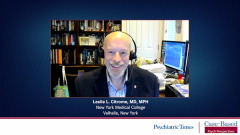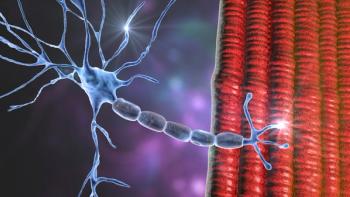
Anticholinergic Medications and Impaired Cognition
In this custom video series, Leslie L. Citrome, MD, MPH, and Rose Mary Xavier, PhD, MS, RN, PMHNP-BC, caution against the use of anticholinergic medications for Parkinson’s disease and comment on the use of alternative therapies for appropriate patients.
Episodes in this series

Leslie L. Citrome, MD, MPH: There’s one thing about Cogentin [benztropine] that we didn’t talk about. Yes, we know it is useful for drug-induced Parkinsonism, but not for TD [tardive dyskinesia], but I wonder how many of our listeners realize how bad it is for someone’s cognition and how it can impact memory. Our patients with schizophrenia, for example, already have impaired cognition to begin with, giving them an anticholinergic load that they do not need, benztropine will influence their memory and make life more difficult for them. So I really try to minimize the exposure to benztropine in my patients, and I think about alternatives all the time. I wanted to mention that because we often forget about it. Dr. Xavier, any comments in your experience about anticholinergics and cognition?
Rose Mary Xavier, PhD, MS, RN, PMHNP-BC: No. I agree with you. Even in my patients, I’m very, very hesitant to use benztropine or any type of anticholinergic medication, but at the same time for acute dystonic reactions, it’s highly effective. Often, we must talk about these two differences too, like for tardive no, but acute movement disorders, like if your dystonic reaction, you can use that. Most of the patients who are on antipsychotic medications, they are not acute cases unless you work in an acute care hospital. As a rule of thumb, I guess in our long-term patients or chronic severely ill patients, I think it makes sense to kind of stay away from any type of anticholinergic medication. Especially given that when we look at the trajectory of cognitive function over the course of years, it tends to get worse and the combined effects of a lot of factors with some mild effects of the medications itself that it is causing some cognitive load, also to the impact of the natural age-related changes and so on. So I agree with you.
Leslie L. Citrome, MD, MPH: Well, I am glad that you have had the same experiences as I did in that regard. To our audience, we chatted before, and we worked in very similar settings. I used to work in a state hospital system in New York and ran an inpatient unit for many years. It was dedicated to research and evaluation, but we did a lot of treatment. We also conducted clinical trials, including in tardive dyskinesia. These patients were very vulnerable to cognitive impairment associated with medicines that we prescribed pretty much routinely. I also have experienced with the act team as Dr. Xavier does and our local act team sort of community treatment team treats very similar patients to who I treated in the state hospital system, very vulnerable people, and exposing them to more anticholinergic is bad news. Now, you did raise one exception. What if they have an acute dystonic reaction like this? I am imitating an acute dystonia, very painful, neck contracts and they really are in much distress. Benztropine can help with that very effectively. The ultimate solution to this problem is going to be changing that anti-psychotic. It is not going to be giving benztropine forever. One person told me that benztropine is a date, not a marriage. That is one way of looking at it. You are going to use benztropine when you need to, but you are not going to want someone to be on it permanently. In fact, in a continuing medical education program that I give, I made a slide of a bottle of Cogentin with skull and crossbones on it to make this point. That basically it is poison. Poison can be therapeutic when used carefully in small doses for a short period of time, but you do not want to give it long-term high dose. So often I see people being put on prophylactic benztropine even before they have had any kind of movement disorder because this is what we used to do with haloperidol in the old days. It is not necessary with the second-generation antipsychotics. I did want to emphasize that point for listeners.
Transcript edited for clarity.
Newsletter
Receive trusted psychiatric news, expert analysis, and clinical insights — subscribe today to support your practice and your patients.











